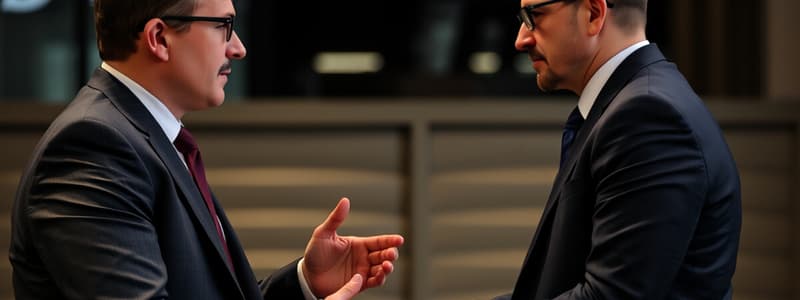Podcast
Questions and Answers
What is the main focus of 'Never Split the Difference' by Chris Voss?
What is the main focus of 'Never Split the Difference' by Chris Voss?
- Understanding emotional intelligence
- Conflict resolution methods
- Strategies for negotiation (correct)
- Techniques for effective communication
Who is the author of 'Never Split the Difference'?
Who is the author of 'Never Split the Difference'?
- Chris Voss (correct)
- Malcolm Gladwell
- Daniel Kahneman
- Robert Cialdini
What is the significance of effective negotiation according to Chris Voss?
What is the significance of effective negotiation according to Chris Voss?
- It is important solely for business transactions.
- It is merely about winning arguments.
- It lacks relevance in everyday interactions.
- It can determine outcomes in life-threatening situations. (correct)
What is essential to achieve real leverage in negotiation according to Chris Voss?
What is essential to achieve real leverage in negotiation according to Chris Voss?
What is a key aspect of negotiation highlighted by Chris Voss?
What is a key aspect of negotiation highlighted by Chris Voss?
What does Chris Voss suggest is crucial for a successful negotiation environment?
What does Chris Voss suggest is crucial for a successful negotiation environment?
Which cognitive behavior challenges traditional negotiation methods?
Which cognitive behavior challenges traditional negotiation methods?
What caution does the content present regarding the publication of 'Never Split the Difference'?
What caution does the content present regarding the publication of 'Never Split the Difference'?
What is Chris Voss's profession related to negotiations?
What is Chris Voss's profession related to negotiations?
According to the information provided, how does StoryShots operate?
According to the information provided, how does StoryShots operate?
What might be a key theme discussed in Chris Voss's negotiation strategies?
What might be a key theme discussed in Chris Voss's negotiation strategies?
What does Chris Voss suggest as a way to handle negativity during negotiation?
What does Chris Voss suggest as a way to handle negativity during negotiation?
What is the nature of negotiation as described by Chris Voss?
What is the nature of negotiation as described by Chris Voss?
What should readers be aware of regarding the nature of the summary of 'Never Split the Difference'?
What should readers be aware of regarding the nature of the summary of 'Never Split the Difference'?
What misconception does Chris Voss reject regarding negotiation?
What misconception does Chris Voss reject regarding negotiation?
Where has Chris Voss taught negotiation skills?
Where has Chris Voss taught negotiation skills?
What is the main focus of Chris Voss's negotiation techniques in his book?
What is the main focus of Chris Voss's negotiation techniques in his book?
How does Voss suggest transforming a tense negotiation?
How does Voss suggest transforming a tense negotiation?
In Voss's view, what often leads to frustration during negotiations?
In Voss's view, what often leads to frustration during negotiations?
What does Voss mean by 'tactical empathy'?
What does Voss mean by 'tactical empathy'?
What can be achieved by using the phrase 'That's right' in a conversation, according to Voss?
What can be achieved by using the phrase 'That's right' in a conversation, according to Voss?
What situational background did Chris Voss have that influenced his negotiation techniques?
What situational background did Chris Voss have that influenced his negotiation techniques?
What overarching theme does Voss emphasize throughout 'Never Split the Difference'?
What overarching theme does Voss emphasize throughout 'Never Split the Difference'?
What does 'bargain hard' imply in Voss's negotiation techniques?
What does 'bargain hard' imply in Voss's negotiation techniques?
What is one key mistake negotiators often make?
What is one key mistake negotiators often make?
Why is effective empathy important in negotiations?
Why is effective empathy important in negotiations?
What did Chris Voss learn from the bank robbery negotiation?
What did Chris Voss learn from the bank robbery negotiation?
What does Voss suggest negotiations should primarily be viewed as?
What does Voss suggest negotiations should primarily be viewed as?
What happens to the other party if a negotiator seems hurried?
What happens to the other party if a negotiator seems hurried?
Which voice type does Voss recommend using during negotiations?
Which voice type does Voss recommend using during negotiations?
How can rapport be initially established in negotiations?
How can rapport be initially established in negotiations?
What crucial environment does Voss stress for effective negotiations?
What crucial environment does Voss stress for effective negotiations?
What is the term used to describe the matching of brain activity with another person's emotions through observation?
What is the term used to describe the matching of brain activity with another person's emotions through observation?
Which of the following phrases should you start with when labeling an emotion?
Which of the following phrases should you start with when labeling an emotion?
What effect does labeling negative emotions have during a negotiation?
What effect does labeling negative emotions have during a negotiation?
Why should you take a 'no' in a negotiation as the beginning rather than the end?
Why should you take a 'no' in a negotiation as the beginning rather than the end?
In negotiating, what is a counterfeit 'yes'?
In negotiating, what is a counterfeit 'yes'?
What is an emotional cue that can be observed to understand another person's feelings?
What is an emotional cue that can be observed to understand another person's feelings?
How can labeling positive emotions impact a negotiation?
How can labeling positive emotions impact a negotiation?
What should you focus on instead of pushing for a 'yes' in a negotiation?
What should you focus on instead of pushing for a 'yes' in a negotiation?
What is a common mistake that negotiators tend to make?
What is a common mistake that negotiators tend to make?
What fundamental element does Chris Voss emphasize for establishing rapport in negotiation?
What fundamental element does Chris Voss emphasize for establishing rapport in negotiation?
According to Chris Voss, how should negotiations be perceived?
According to Chris Voss, how should negotiations be perceived?
What impact does seeming hurried have on the negotiation process?
What impact does seeming hurried have on the negotiation process?
What type of voice does Chris Voss recommend using in negotiations?
What type of voice does Chris Voss recommend using in negotiations?
What aspect of negotiation does Voss believe is crucial to creating a safe environment for conversation?
What aspect of negotiation does Voss believe is crucial to creating a safe environment for conversation?
What was a critical piece of information Voss realized when negotiating during the bank robbery?
What was a critical piece of information Voss realized when negotiating during the bank robbery?
What does Voss suggest can be achieved by labeling emotions during negotiations?
What does Voss suggest can be achieved by labeling emotions during negotiations?
What tone is recommended for creating a relaxed atmosphere during negotiations?
What tone is recommended for creating a relaxed atmosphere during negotiations?
Which approach can encourage participants to reveal more information during negotiations?
Which approach can encourage participants to reveal more information during negotiations?
What initial phrase should you use to display openness in negotiations?
What initial phrase should you use to display openness in negotiations?
What is the purpose of tactical empathy in negotiations?
What is the purpose of tactical empathy in negotiations?
When should the direct/assertive voice be used during negotiations?
When should the direct/assertive voice be used during negotiations?
What can result from using the mirroring technique effectively, as seen in the study with waiters?
What can result from using the mirroring technique effectively, as seen in the study with waiters?
What step is NOT part of the five-step process in negotiations according to the content?
What step is NOT part of the five-step process in negotiations according to the content?
What effect does labeling negative emotions have during negotiations?
What effect does labeling negative emotions have during negotiations?
What type of 'yes' is crucial for achieving a definite outcome in negotiations?
What type of 'yes' is crucial for achieving a definite outcome in negotiations?
How can acknowledging the other party's concerns effectively influence a negotiation?
How can acknowledging the other party's concerns effectively influence a negotiation?
What is a strategy mentioned that can help bend the reality of the other party?
What is a strategy mentioned that can help bend the reality of the other party?
In the context of negotiation, what is the purpose of inflaming the other party's loss aversion?
In the context of negotiation, what is the purpose of inflaming the other party's loss aversion?
Why might someone be perceived as a 'fair' negotiator?
Why might someone be perceived as a 'fair' negotiator?
What type of affirmation is considered more effective than a simple 'yes' in negotiations?
What type of affirmation is considered more effective than a simple 'yes' in negotiations?
What can be a consequence of allowing the other party to anchor monetary negotiations?
What can be a consequence of allowing the other party to anchor monetary negotiations?
What aspect of the negotiation process is emphasized by using the phrase 'that's right' effectively?
What aspect of the negotiation process is emphasized by using the phrase 'that's right' effectively?
What is the first step in the Ackerman Model of negotiation?
What is the first step in the Ackerman Model of negotiation?
What type of numbers should you use when calculating the final offer amount?
What type of numbers should you use when calculating the final offer amount?
How should negotiators handle monetary issues during a discussion?
How should negotiators handle monetary issues during a discussion?
What does the term 'splitting the difference' imply in negotiations?
What does the term 'splitting the difference' imply in negotiations?
Why should a negotiator throw in a non-monetary item with their final offer?
Why should a negotiator throw in a non-monetary item with their final offer?
Which approach is recommended for preventing confrontation during negotiations?
Which approach is recommended for preventing confrontation during negotiations?
What incremental raises in prices should be set according to the Ackerman Model?
What incremental raises in prices should be set according to the Ackerman Model?
What should negotiators avoid doing during the negotiation process?
What should negotiators avoid doing during the negotiation process?
What is a recommended approach when faced with a higher initial offer during negotiation?
What is a recommended approach when faced with a higher initial offer during negotiation?
What type of questions does Voss recommend using to create an illusion of control in negotiations?
What type of questions does Voss recommend using to create an illusion of control in negotiations?
Which strategy can increase the likelihood of your offer being accepted?
Which strategy can increase the likelihood of your offer being accepted?
How can negotiators demonstrate reasonableness in their offers?
How can negotiators demonstrate reasonableness in their offers?
What effect do arbitrary numbers have on negotiations according to Voss?
What effect do arbitrary numbers have on negotiations according to Voss?
What non-monetary strategy can be effective during negotiations?
What non-monetary strategy can be effective during negotiations?
Why is it beneficial to establish a range during negotiations?
Why is it beneficial to establish a range during negotiations?
What could be an effective calibrated question during a negotiation?
What could be an effective calibrated question during a negotiation?
Study Notes
Overview of "Never Split the Difference" by Chris Voss
- Author Chris Voss utilized his extensive experience as an FBI hostage negotiator to devise negotiation techniques aimed at revealing the emotional aspects behind effective communication.
- The book emphasizes that traditional negotiation methods often rely too much on logic, whereas emotional intelligence plays a crucial role in successful negotiations.
About Chris Voss
- Voss began his career as a police officer in Kansas City before rising to become the FBI’s lead kidnapping negotiator.
- He has interacted with various high-stakes criminals, including bank robbers and terrorists.
- Currently, Voss is the CEO of The Black Swan Group Ltd, focusing on negotiation training, and serves as an adjunct professor at Georgetown University.
New Rules of Good Negotiators
- Effective negotiation requires understanding human psychology rather than solely relying on logic and reason.
- Active listening is crucial as it demonstrates empathy and helps establish a connection with the negotiating counterpart.
- Research by psychologists has shown that cognitive biases lead to irrational decision-making, making it vital to understand these influences during negotiations.
Building an Efficient Negotiation Environment
- Establishing rapport is essential for trust and effective communication in negotiations.
- Collecting extensive information about the counterpart enhances negotiation outcomes, as illustrated by Voss’s experience during a bank robbery negotiation.
- Negotiation should be viewed as a collaborative discovery process rather than a confrontational argument.
The Importance of Empathy and Labeling
- Empathy should be demonstrated through effective communication, where listening and validating the counterpart’s concerns creates an open dialogue.
- Voss identifies three voices for negotiation: the calm “late-night FM DJ” voice helps facilitate understanding and connection.
- Labeling emotions, such as acknowledging frustration, can help diffuse tension and encourage a constructive response from the counterpart.
Tactical Use of "No"
- The word "no" serves as a strategic tool in negotiations, uncovering underlying concerns and facilitating further dialogue.
- It is suggested that getting a "no" should be seen as an entry point into deeper negotiation rather than a point of defeat.
- Different types of "yes" responses include counterfeit yes (avoidance), confirmation yes (straightforward), highlighting the necessity to probe for clarification.
Key Quotes
- "To get real leverage, you have to persuade them that they have something concrete to lose if the deal falls through."
- "Research shows that the best way to deal with negativity is to observe it, without reaction and without judgment."
Overall Themes
- Emotional intelligence and empathy are critical to successful negotiation.
- A well-prepared negotiator collects information, builds trust, and navigates the emotional landscape of discussions.
- Seeing negotiation as a collaborative act transforms outcomes, benefiting all parties involved.
Understanding Negotiation Psychology
- Grasping human negotiation psychology enhances negotiation success.
- Rushing through negotiations is a common pitfall for many negotiators.
Building an Efficient Negotiation Environment
- Establishing rapport quickly through effective empathy fosters trust.
- Accumulating information about your counterpart and the situation is crucial.
- Example: During the 1993 Manhattan bank robbery, Voss uncovered that a robber was lying about the number of hostages, which aided in successful negotiation.
Negotiation as Discovery
- View negotiation as discovering information rather than a confrontational argument.
- Listening to the other party helps validate their concerns and builds trust.
- Slow negotiation processes promote feelings of being heard, while hurrying may cause distrust.
The Three Voices for Negotiation
- Late-night FM DJ Voice: Calm and slow; creates authority and trust.
- Playful/Positive Voice: Default voice that encourages open communication.
- Direct/Assertive Voice: Used sparingly; can lead to resistance.
Mirroring Technique
- Mirroring involves repeating key phrases in a curious tone to encourage the counterpart to share more.
- Psychologist Richard Wiseman’s study: Waiters who mirrored received 70% more tips.
- Utilize the five-step process in negotiations: use a calm voice, exhibit openness, mirror, employ silence, and repeat.
Tactical Empathy and Labeling
- Tactical empathy involves understanding feelings while listening attentively.
- Tactically labeling the other party's emotions helps build rapport and influence outcomes.
Importance of “That’s Right”
- Summarizing and acknowledging the other party's concerns with “That’s right” fosters agreement and breakthroughs, more effectively than mere “yes.”
Bending Reality in Negotiations
- Starting with an extreme offer can significantly influence negotiation dynamics.
- Reputation for fairness is key; it does not imply being submissive but understanding mutual preferences.
- Empathy strengthens reality bending; recognizing fears can induce loss aversion in counterparts.
Create an Illusion of Control
- Use calibrated questions starting with “what” or “how” to lead discussions without direct confrontation.
- Calibrated questions aim to educate rather than dictate.
The Ackerman Model
- A structured six-step approach to maximize negotiation outcomes:
- Set target price.
- First offer at 65% of target.
- Incrementally raise offers (85%, 95%, then full target).
- Use empathy to prompt a counteroffer.
- Utilize precise and arbitrary numbers in final offers.
- Introduce non-monetary items to suggest limits in negotiation.
Final Summary
- Avoid hastily accepting compromises, which often leads to unfavorable results.
- "Splitting the difference" can result in suboptimal outcomes in negotiations, exemplified by situations like ransom discussions.
Studying That Suits You
Use AI to generate personalized quizzes and flashcards to suit your learning preferences.
Description
Explore the key concepts and techniques from Chris Voss's 'Never Split the Difference'. This book highlights the importance of emotional intelligence in negotiations, drawing from Voss's experiences as an FBI hostage negotiator. Learn how to effectively communicate and negotiate in various situations.




